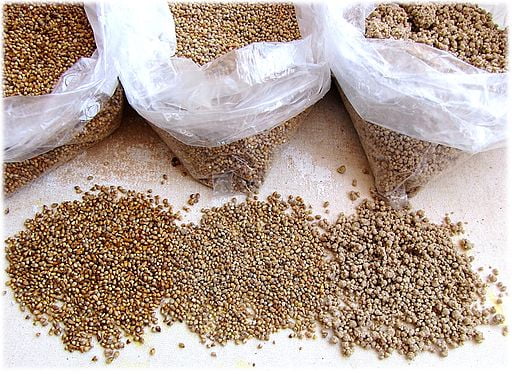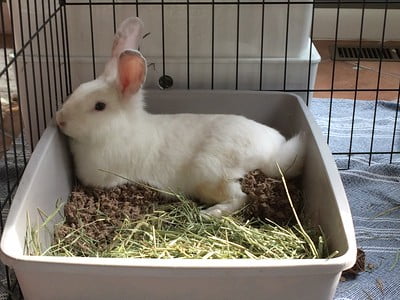Last Updated on March 2, 2023 by Marjon Ramos
A rabbit that’s not pooping can be a sign of gastrointestinal stasis.
This condition happens when your rabbit’s gut suddenly stops moving, is full of gas, or when it’s blocked.
GI stasis is a serious medical condition that should be looked at by a veterinarian.
A lot can cause your rabbit to develop GI stasis.
The most common reasons are stress, pain, dehydration, low-fiber/high-carb diet, lack of exercise, or intestinal blockages.
To know for sure that your rabbit is suffering from GI stasis they will have additional symptoms such as: loss of appetite, signs of pain (loud teeth grinding and hunched position), small or no stool, and loud GI sounds.
If your rabbit is not pooping and exhibiting any additional symptoms above, immediately bring your rabbit to a veterinarian.
Now that I’ve given you the gist of the article, read on as I explain in more detail what to do if your rabbit is not pooping:
Table of Contents
What can cause your rabbit to not poop?
In order to properly know what actions you need to take when you notice that your rabbit is not pooping, you must first know why it’s happening in the first place.
Here are the most common reasons why your rabbit is not pooping:
Dental Problems
Dental problems are one of the most common reasons why a rabbit suddenly stops pooping.
You see, rabbits’ teeth continuously grow throughout their lives.
Normally, rabbits’ teeth grow approximately 1 cm each month.
Rabbits that are not eating hard enough food can develop an overgrowth of teeth, which can lead to dental pain.
A rabbit that’s in pain due to dental problems would often refuse to eat or only eat a little.
A rabbit that’s refusing to eat would eventually lead to some kind of digestive problem like GI stasis.
Rabbits need to constantly eat for their gut to function properly.
One of the symptoms of GI stasis is a rabbit that has stopped pooping.
Wrong diet
Another major reason why your rabbit suddenly stops pooping is that you’re feeding it the wrong diet.
Rabbits need a constant supply of fiber for their guts to function properly.
Rabbits’ diets should also be low in carbs because too many carbs can lead to an imbalance in their gut flora, which in turn could lead to painful gas.
Make sure that the majority of your rabbit’s diet is composed of fiber in the form of hay.
You should also limit the amount of unnecessary food you give your rabbit (treats).
Veggies should be kept to a minimum and should never be fed in lieu of hay.
Dehydration
Dehydration can also lead to reduced gut movement that can cause a rabbit to stop pooping.
Rabbits normally drink 50–100 mL/kg of water every 24 hours.
But the amount I mentioned above is highly dependent on your rabbit’s diet.
Rabbits that are eating a lot of fresh green vegetables may not drink water at all because most of these plants are already high in water content.
While rabbits that are on a high protein diet need to drink more water than 50-100 mL/kg every 24 hours.
Finally, rabbits that are eating a lot of fibrous, salty, or dry foods tend to drink more water than usual.
This type of food absorbs water in the intestinal tract, which can increase thirst.
Your rabbit’s intestine would likely become dry without enough water, which in turn could slow down the gut movement of your rabbit.
That’s why it’s important that you give your rabbit unlimited amounts of clean, drinkable water and let them decide how much water they want to drink.
Intense pain
Another possible reason why your rabbit is not pooping is due to intense pain.
If your rabbit is suffering from an illness, for example, it might stop eating altogether due to the pain.
Rabbits are really good at hiding when they’re in pain. Any sign of weakness in the wild would only invite predators and, in turn, their demise.
To know that your rabbit is experiencing pain, you need to look out for the following symptoms:
- Loud teeth grinding
- Hunched body posture
- Depression
- Lethargy
If you notice any of the following symptoms, bring your rabbit to a veterinarian for proper advice.
How long can rabbits survive without pooping?
The amount of time a rabbit can survive if they are not pooping is highly dependent on the cause.
As an example, if your rabbit is suffering from GI stasis, it could die in 12–48 hours after showing initial symptoms.
That’s why it’s important that any changes in your rabbit’s bowel movements should be considered an emergency.
What to do if your rabbit is not pooping?
The best thing to do when your rabbit is not pooping is to bring your rabbit to a veterinarian.
Rabbit-savvy vets are the only ones who can accurately diagnose what to do.
In the meantime, I suggest that you give your rabbits enough water and a lot of hay to not make the problem any worse.
Conclusion
A rabbit that’s not pooping can be due to GI stasis, which can lead to death if not treated immediately.
GI stasis is a condition that happens when your rabbit’s gut suddenly stops moving, is blocked, or is full of gas.
A lot of things can cause GI stasis, like stress, dehydration, pain, lack of exercise, intestinal blockage, or a low-fiber or high-carb diet.
If you notice that your rabbit is not pooping, you should consider this an emergency and bring your rabbit to a veterinarian.
Most rabbits could die within 12–48 hours from GI stasis if it’s not treated immediately.
Cite this article:
Related Articles
- Why Is My Rabbit Drinking A Lot Of Water?
- Rabbit Pooping Everywhere. But Why?
- Rabbit Has Poop Stuck To His Bum. What Is It And What To Do About It?
- How Long Can Rabbits Go Without Pooping?
- How Much Poop Does A Rabbit Produce In A Day?
- How To Stop Your Rabbit From Licking Their Stitches?
- What To Do If Your Rabbit Won’t Eat After Being Spayed?
Sources
Image source – FASTILY, CC BY-SA 3.0 https://creativecommons.org/licenses/by-sa/3.0, via Wikimedia Commons




